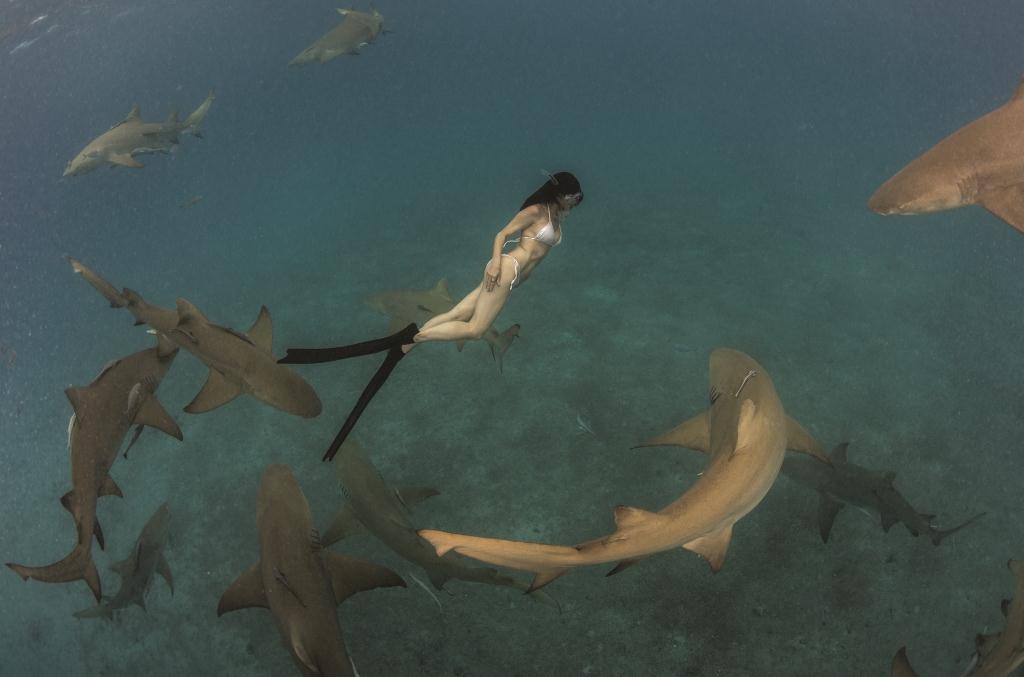To think Leslie Rochat was once afraid of sharks. Very afraid.
But who wasn’t? The 1975 film Jaws got people wary of oceans, seas, puddles, buckets of water even.
“My nickname was ‘Shark Bait’ by my diving buddies because I was so scared,” says Rochat.
“How far would you go to conquer your fear? For me, this thing that I was very afraid of, sharks, went so much further than that. I loved the ocean but when I was six years old, I nearly drowned in the ocean and was saved by a lifeguard. I had a real fear of sharks but I believe the way of conquering fear, you have to face it, you have to understand it. In my case, it was exactly that, putting myself in those environments, and dump that name Shark Bait, which was pretty funny, but I was seriously petrified.”
The former TV presenter, model and financial advisor packed up her corporate job in 2003 to found AfriOceans Conservation Alliance, a non-profit organization in Cape Town, South Africa, to drive education, awareness and lobbying initiatives.

She designed a unique shark conservation program that involved the satellite tagging and release of captive sharks.
Rochat dives with the sharks, spending enough time with them, analyzing them.
“The first couple of times you dive, you are nervous because you’re preconditioned to believe the misconception of sharks that is perpetuated is true.”
Rochat has now earned a new nickname – the Shark Warrior. Also an underwater photographer and environmental journalist, the desire to conquer her fears was stoked in 2001 by Maxine, a Ragged Tooth Shark in Cape Town.
“I was writing an article on the plight of sharks and I went to the Two Oceans Aquarium to dive into the tank and get photographs. And I noticed that there was a shark there, there were five, but the one had a scar around her whole neck, her gills.”
“I found out that Maxine had been caught six years prior in the shark nets in KwaZulu-Natal that capture over 600 of our sharks every year and many other marine animals, and most sharks die. Her species, the Ragged Tooth, is able to ventilate stationary; most sharks have to keep moving. She was able to survive,” she says.
On a cold winter morning in 2004, Rochat and a group of aquarists from the Two Oceans Aquarium slipped Maxine from her mobile tank onto an inflatable craft, and into the ocean. She then raised enough money to release the other four sharks.
“Now as a result of my work, I’m proud to say that the sharks never stay in the aquarium forever. Every four years they return that animal and catch another one and put them in for four years. So it continues to contribute to the science and also the animals don’t have to live in captivity their whole lives,” she says.
Rochat is conquering all her fears. She built her house in Franschoek, a small wine town in the Western Cape, herself. A steep stairway takes you to the wooden balcony enveloping the open plan lounge, kitchen and dining room. It’s breathtaking.
“Physically, on my hands and knees, I built this house. I was afraid because I’ve never built a house in my flipping life and it’s a daunting thing to do, you know? There’s nothing you can’t do if you really want to,” she says.
Facing her fears head on, she’s a warrior with bite and her conservation efforts just might save a dwindling shark population.
